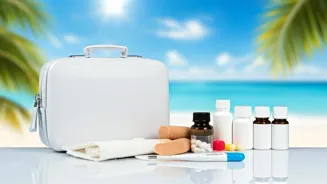Prioritize Sleep
Adequate rest is a cornerstone of good health, especially when traveling. Prioritizing sleep can significantly boost your immune system, making it more
capable of fighting off infections you might encounter. Adjusting to new time zones and travel routines can disrupt your sleep schedule; therefore, try to maintain a consistent sleep pattern as much as possible. Ensure you're getting sufficient sleep to help your body to recover and function optimally. Lack of sleep can weaken your defenses, increasing your susceptibility to illnesses. So, before, during, and after your trip, make sleep a priority to keep your immune system robust.
Maintain Activity
Regular physical activity is another vital aspect of maintaining your well-being while traveling. This doesn't necessarily mean rigorous workouts; it could be as simple as walking, stretching, or exploring new places on foot. Being active improves circulation, which is good for overall health and can also enhance your mood. Regular physical activity bolsters the immune system and contributes to a better sense of well-being, making you less vulnerable to travel-related health issues. Staying active also prevents fatigue, allowing you to enjoy your adventures more fully, without the added burden of feeling unwell or run down.
Dress Appropriately
Weather conditions can vary greatly when you travel, so dressing correctly is essential for preventing illness. Check the forecast and pack suitable clothing for the climate you'll be in. Layers are particularly helpful, allowing you to adjust your attire easily as temperatures change throughout the day. In cold weather, wear warm layers to maintain body heat and avoid conditions like hypothermia. If you're traveling to a hot climate, wear light, breathable fabrics and protect yourself from the sun with hats and sunscreen. Ensuring that you are dressed adequately for your environment protects you from potential health risks and makes your trip more enjoyable and healthier.
Stay Hydrated Regularly
Staying hydrated is crucial for good health, especially while traveling. Dehydration can lead to various problems like fatigue, headaches, and constipation, potentially spoiling your trip. Always carry a water bottle and refill it regularly, especially if you are spending time outdoors or engaging in physical activities. Drink water consistently throughout the day, even when you're not feeling thirsty. Avoid excessive amounts of sugary drinks and opt for water or electrolyte-rich beverages, especially when it is hot. Keeping hydrated promotes overall wellness, helps with the body's processes, and enhances your overall experience, and can also improve your ability to resist various diseases and illnesses.
Practice Respiratory Hygiene
Respiratory etiquette is key to preventing the spread of germs, especially in crowded travel environments. If you cough or sneeze, cover your mouth and nose with a tissue or your elbow to stop the droplets that might spread to others. Dispose of used tissues immediately and wash your hands often with soap and water or use hand sanitizer. This simple practice helps protect yourself and others from catching or spreading infections like colds and the flu. By being mindful of your respiratory hygiene, you contribute to the health and well-being of everyone you encounter during your trip.
Avoid Sick People
To stay healthy while traveling, it is important to minimize contact with people who are sick. If you notice that someone is coughing, sneezing, or showing signs of illness, try to maintain a safe distance. Avoid sharing utensils, cups, or other items that could transmit germs. Sometimes, it is impossible to fully avoid those who are sick. In such situations, consider wearing a mask to protect yourself, or frequent hand washing. This measure can greatly reduce your chances of getting sick while on your journey and lets you to savor your trip with less concern.
Food Consumption Safety
Be careful when you consume food, to avoid potential stomach upsets or infections. Stick to safe food choices to minimize your risk of foodborne illnesses. It is recommended to eat at reputable establishments and avoid street food unless it's from a vendor with good hygiene practices. Make sure that the food is thoroughly cooked and served hot, especially meat and seafood. Avoid raw or undercooked foods and unpasteurized dairy products. Careful consumption of food and water can help make your trip safer and healthier, and enable you to thoroughly enjoy the different flavors and experiences that food can give on your travel journey.












